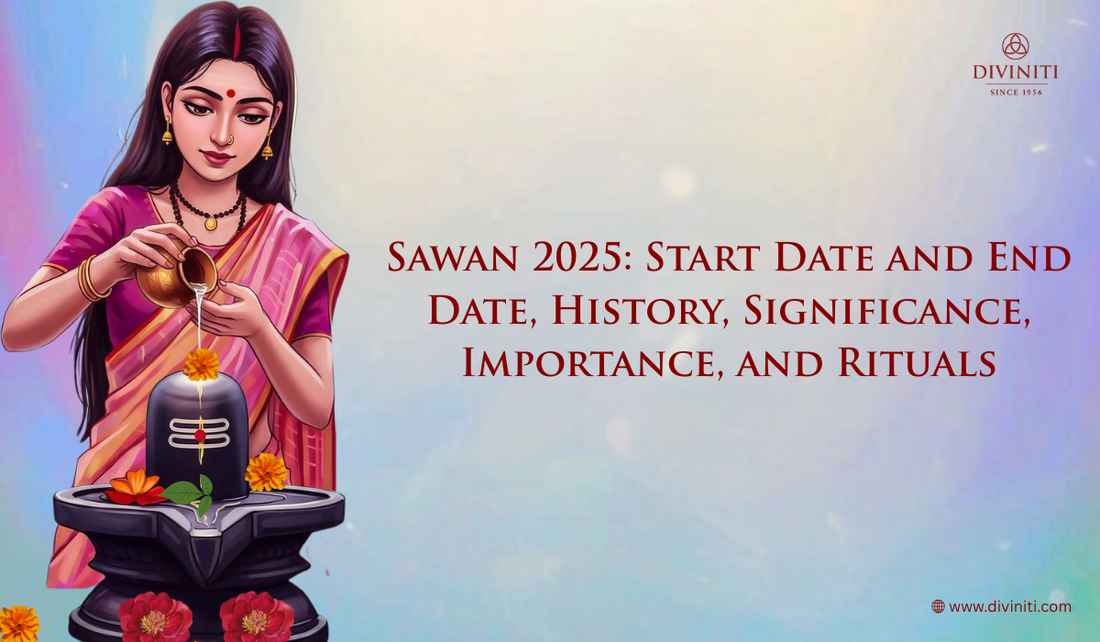
Sawan Somvar: History, Significance, Importance, Dates, and Rituals
The holy month of Sawan (Shravan) holds a special place in the hearts of Lord Shiva devotees. Known for its deep spiritual energy, this holy month is completely dedicated to the worship of Bhalenath (Lord Shiva). Between all days in Sawan, Sawan Somwar - Monday of Srivan - is considered to be the most auspicious and powerful. Fasting, prayer and spiritual practices performed during Sawan Somwar fast are believed to bring freedom from blessings, peace, marital harmony and sins. In this blog, we detect history, spiritual importance, importance, 2025 dates and rituals associated with this divine observation.
History of Sawan and Sawan Somwar
The origin of Sawan Somwar lies in ancient Hindu mythology and sacred texts. According to the Shiva Purana, during the cosmic event, known as Samadra Manthan (The Manthan of the Ocean), a deadly poison called Halahla. To protect the universe from destruction, Lord Shiva consumed poison and grabbed it around his neck, which turned into blue - earned it by the name Neelkant. To reduce his pain, the gods and devotees began offering him cold elements such as milk and water, and this practice eventually became the foundation of Sawan Puja. Since this cosmic event took place during the month of Shravan, it became a time of devotion, gratitude and penance.
Importance of Sawan Somwar
1. Special relationship with Lord Shiva The entire month of Sawan is dedicated to Lord Shiva, but Monday (Somwar) is particularly powerful because he is traditionally considered Shiva's favorite day.
2. Somwar Vrat (Monday fast) Sawan Somvar Vrat is one of the most important fasts for Shiva devotees. People see it: Look for the blessings of Lord Shiva Get marital bliss and harmony Fulfilling desires and remove obstacles from life
3. Spiritual upliftment It is believed that it is believed to bring Sawan: Inner peace and power Conflict with material desires Purification of mind, body and soul
Sawan fasting scientific and Ayurvedic relevance
When the digestion of the body slows down, the spring falls during the monsoon season. Ayurveda recommends eating light and detoxing during this period. Fasting on Sawan Somwar helps: Promote metabolism, Improve immunity, Clean toxins Bring mental clarity and peace. Therefore, the spring fasting has both spiritual and physical health benefits.
Sawan Somvar 2025 Dates
The Sawan month varies between North India and South India due to different lunar calendar systems.
North India (Purnimant Calendar)
-
Sawan Begins: Tuesday, July 8, 2025
-
Sawan Ends: Wednesday, August 6, 2025
Sawan Somvar Vrat Dates (North India):
-
July 14, 2025 – First Somvar
-
July 21, 2025 – Second Somvar
-
July 28, 2025 – Third Somvar
-
August 4, 2025 – Fourth Somvar
South India (Amavasyant Calendar)
-
Sawan Begins: Thursday, July 24, 2025
-
Sawan Ends: Friday, August 22, 2025
Sawan Somvar Vrat Dates (South India):
-
July 28, 2025
-
August 4, 2025
- August 11, 2025
-
August 18, 2025
Rituals of Sawan Somvar
1. Early Morning Bath and Cleanliness
Devotees wake up early, take a holy bath, preferably in a river or pond, and wear clean white or saffron clothes.
2. Fasting (Vrat)
-
Some observe a nirjala vrat (no food or water), while others take fruits and milk only.
-
The fast is kept from sunrise to sunset and broken after evening prayers.
3. Shiva Abhishekam (Sacred Bathing of Shiva Lingam)
Devotees visit Shiva temples to perform Abhishek (ritual bathing) of the Shivalinga with:
-
Milk
-
Water
-
Honey
-
Curd
-
Ghee
-
Sugar (Panchamrit)
They also offer Bel Patra (Bilva leaves), Dhatura, white flowers, fruits, and incense.
4. Chanting and Bhajans
Mantras chanted include:
-
“Om Namah Shivaya”
-
Maha Mrityunjaya Mantra
-
Shiv Tandav Stotram
- 108 Names of Lord Shiva
Devotional bhajans and aartis are sung in temples and homes.
5. Evening Aarti and Storytelling
Many devotees gather to perform Shiv Aarti and listen to or recite stories related to Lord Shiva, especially the tale of Sawan Somvar Vrat Katha.
Sawan 2025 Benefits of Observing Somvar Vrat
-
Fulfillment of wishes and desires
-
Stronger marital bond and harmony
-
Removal of past sins and karmic debt
-
Protection from negative energies
-
Attainment of inner peace and spiritual growth
Tips for Observing Sawan Somvar Vrat
-
Avoid non-vegetarian food, onion, and garlic throughout Sawan
-
Refrain from anger, lies, and gossip
-
Focus on meditation, chanting, and charity
-
Visit Shiva temples or set up a shrine at home
-
Maintain cleanliness and devotion throughout the day
Frequently Asked Questions (FAQs)
Q1. Can anyone observe Sawan Somvar Vrat?
A. Yes, anyone — men, women, and even children — can observe the fast with devotion.
Q2. What should I avoid eating during the Sawan fast?
A. Avoid grains, salt, onion, garlic, and non-veg. Fruits, milk, and vrat-friendly items like sabudana are recommended.
Q3. Can I do the puja at home?
A. Yes, you can perform Shiva Abhishekam and chant mantras at home if you cannot visit a temple.
Q4. Is there a specific mantra to chant on Sawan Somvar?
A. “Om Namah Shivaya” and “Maha Mrityunjaya Mantra” are the most powerful mantras to chant during Sawan.
Q5. What time should I start and end the fast?
A. Start after sunrise and break the fast after evening aarti or prayers.
Conclusion
The sacred observance of Sawan Somvar is more than just a ritual — it’s a beautiful spiritual journey that brings us closer to Lord Shiva. By observing the fast, performing the puja, and embracing devotion during this sacred month, devotees can purify their hearts, fulfill their wishes, and experience a divine transformation.
This Sawan 2025, immerse yourself in the bhakti of Mahadev and feel the eternal grace of the Neelkanth.
Har Har Mahadev!
Also Read:- Chant 108 names of lord shiva || 12 Jyotirlinga || Who are Lord Shiva’s Father




